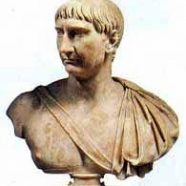
Education and Philosophy*
Most people in the ancient Roman Empire could not afford an extensive education. Slaves were trained for their specific duties; the poor continued in family agrarian life or were apprenticed to a specific craft. However, education was central to the Hellenistic ideal.
Formal education was generally private. Certain slaves, called pedagogues, could be responsible for overseeing the education of their master’s children through hiring teachers. That teacher would educate the children in a set curriculum, including reading and writing, literature, mathematics, Greek and/or Latin, rhetoric, and philosophy. Rhetoric (the study of verbal persuasion) was necessary for political and legal life, and philosophy was considered the highest expression of learning.
Philosophy involved investigation into the physical and conceptual makeup of the world (metaphysics as well as science) and into ethics. Most religions in antiquity did not substantively address ethical matters (Judaism and Christianity were significant exceptions); rather, this was the realm of philosophy. Various competing philosophical systems were taught around the first century – see chart below:
| Middle Platonists |
|
| Sophists |
|
| Cynics |
|
| Epicureans |
|
| Stoics |
|
*Article and table above are from the ESV Study Bible.
What’s different now?
As you review the ancient philosophies in the chart above, reflect on where your might fit in. Is your life guided by your faith or more by one of the ancient (timeless?) philosophies articulated above? The dawn of a new calendar year is always a good time to reflect, reevaluate, and redirect your future.



